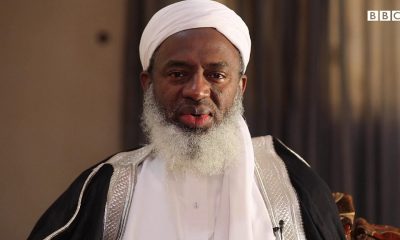International
Gaza rescuers say Israeli strike on school shelter kills 7
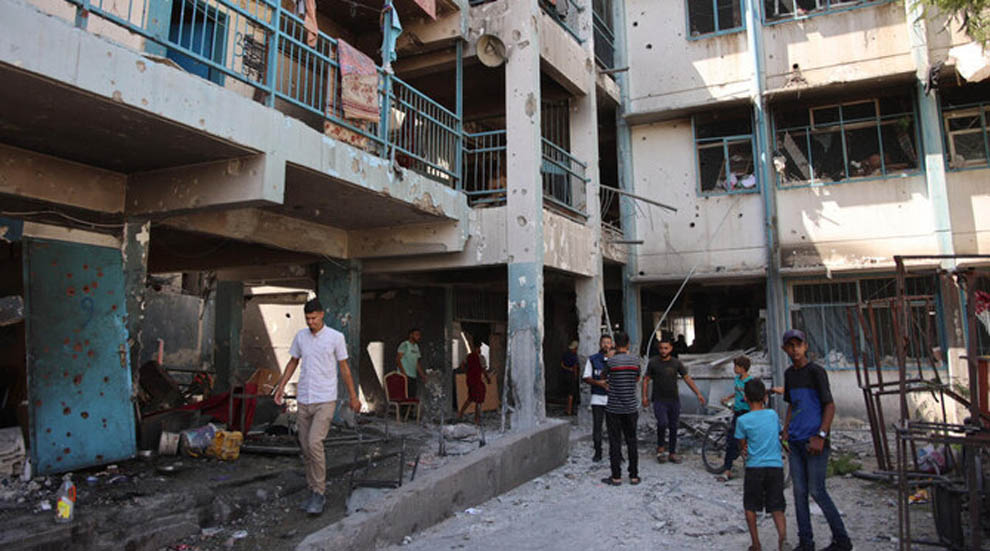
Gaza rescuers say Israeli strike on school shelter kills 7
GAZA STRIP: Civil defense rescuers in Gaza City said an Israeli strike Sunday on a school-turned-shelter killed at least 7 people, with the Israeli military saying it had targeted Hamas militants.
The vast majority of the besieged Gaza Strip’s 2.4 million people have been displaced at least once by the war, sparked by Hamas’s October 7 attack on Israel, with many seeking shelter in school buildings.
Civil defense agency spokesman Mahmud Bassal reported “seven martyrs and a number of wounded, including serious cases, as a result of Israeli shelling of Kafr Qasim School” in the Al-Shati refugee camp.
He said hundreds of displaced Gazans were sheltering there.
The Israeli military said it was targeting Palestinian militants operating from the school grounds, and that its forces had taken steps “to mitigate the risk of harm to uninvolved civilians” including by using “precise munitions” and surveillance.
It said the air force had “conducted a precise strike on Hamas terrorists in the northern Gaza Strip” who were “operating from a compound” at the school complex.
READ ALSO:
- 50 killed and more than 300 wounded in Israeli strikes on Lebanon, health ministry says
- Tinubu orders crackdown on transnational car thieves
- Real Madrid extends unbeaten record to 38, defeat Espanyol 4-1
The military statement did not provide information on casualties.
Sunday’s attack was the latest in a series of Israeli strikes on school buildings housing displaced people in Gaza, where fighting has raged for nearly a year.
On Saturday the civil defense agency said an Israeli strike on another school-turned-shelter, also in Gaza City, had killed 21 people. The military said it was targeting militants.
A strike on the United Nations-run Al-Jawni School in central Gaza on September 11 drew international outcry after the UN agency for Palestinian refugees, UNRWA, said six of its staffers were among the 18 reported fatalities.
The Israeli military accuses Hamas of hiding in school buildings where thousands of Gazans have sought shelter — a charge denied by the Palestinian militant group.
At least 41,391 Palestinians, a majority of them civilians, have been killed in Israel’s military campaign in Gaza since the war began, according to data provided by the health ministry. The United Nations has acknowledged these figures as reliable.
The October 7 attack that triggered it resulted in the deaths of 1,205 people on the Israeli side, most of them civilians, according to an AFP tally based on official Israeli figures, which includes hostages killed in captivity.
Out of 251 people taken hostage that day, 97 are still being held inside the Gaza Strip, including 33 who the Israeli military says are dead.
Gaza rescuers say Israeli strike on school shelter kills 7
International
Zelenskyy Rejects Russia’s Claim of Drone Attack on Putin’s Residence, Warns of Escalation
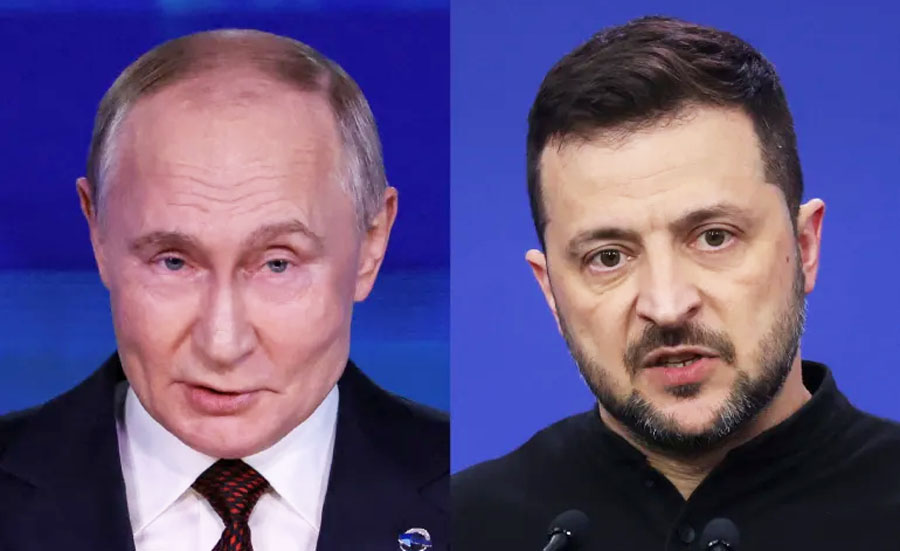
Zelenskyy Rejects Russia’s Claim of Drone Attack on Putin’s Residence, Warns of Escalation
Ukrainian President Volodymyr Zelenskyy has dismissed Russia’s claim that Ukraine launched a drone attack on a residence belonging to Russian President Vladimir Putin, describing the allegation as a fabrication that could be used to justify further military escalation.
Russia’s Foreign Minister Sergei Lavrov alleged that 91 long-range drones were launched overnight on Sunday at Putin’s state residence in the Novgorod region, northwest Russia. According to Moscow, all the unmanned aerial vehicles (UAVs) were intercepted by Russian air defences, with no casualties or damage recorded. The Kremlin did not clarify whether Putin was present at the location at the time.
Responding on Monday, Zelenskyy described the accusation as “typical Russian lies,” warning that it could serve as a pretext for intensified attacks on Ukraine and a hardening of Russia’s stance in ongoing peace negotiations.
“Everyone must be vigilant now. Absolutely everyone. A strike may be launched on the capital,” Zelenskyy told journalists, calling Russia’s statement a “threat” and accusing Moscow of seeking excuses to prolong the war.
In a post on X, the Ukrainian leader urged the international community not to remain silent, warning that Russia must not be allowed to sabotage efforts toward a lasting ceasefire.
READ ALSO:
- Amotekun Arrests 39 Suspected Terrorists Fleeing Sokoto After US Airstrikes
- Nigeria vs Uganda: Key Super Eagles Players Risk Suspension Ahead of AFCON Clash
- Malami, Son, Wife Remanded Over ₦Billions Money Laundering Charges
Lavrov, in a statement published on Telegram, said Moscow would reconsider its negotiating position, citing what he termed the “final degeneration” of Ukraine’s leadership. However, he said Russia would not withdraw from talks with the United States, according to Russian news agency Tass.
On Tuesday, the Kremlin said it would not provide evidence to support its claim, with a spokesperson confirming that Russia would now “toughen” its negotiating stance.
Ukraine’s Foreign Minister Andrii Sybiha rejected the allegation, insisting that Russia had failed to present any credible proof.
“Almost a day has passed, and Russia still hasn’t provided any plausible evidence to its accusations of Ukraine’s alleged attack on Putin’s residence. And they won’t — because there is none,” Sybiha wrote on X.
The controversy follows US-Ukraine talks in Florida on Sunday, where US President Donald Trump and Zelenskyy discussed a revised peace plan. Zelenskyy later told Fox News that there was a “possibility to end the war in 2026,” stressing that Ukraine would require continued US support.
He disclosed that Washington had proposed 15-year security guarantees, with Trump saying negotiations were “95 per cent complete.” Zelenskyy identified territorial disputes, the Russian-occupied Zaporizhzhia nuclear power plant, and unresolved issues in the Donbas region as major sticking points.
The White House confirmed that Trump held what it described as a “positive call” with Putin following the US-Ukraine talks. Kremlin aide Yuri Ushakov said Putin raised the alleged drone incident during the conversation, claiming it occurred shortly after what Washington viewed as a successful diplomatic engagement.
Trump later told reporters he was informed of the incident by Putin and was “very angry,” though he acknowledged that it was also possible the attack had not occurred.
Zelenskyy Rejects Russia’s Claim of Drone Attack on Putin’s Residence, Warns of Escalation
International
China Stages Record Military Exercises Around Taiwan Amid US Arms Deal
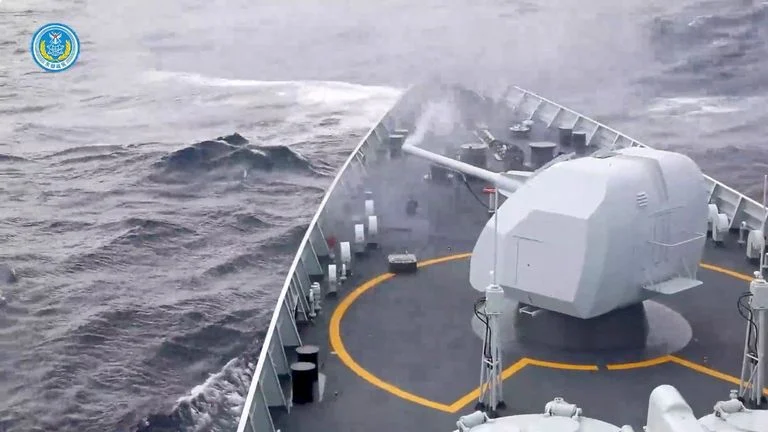
China Stages Record Military Exercises Around Taiwan Amid US Arms Deal
China on Tuesday deployed warships, fighter jets and artillery units in its largest-ever military exercises around Taiwan, simulating a full blockade of the self-governed island amid rising regional tensions.
The drills, codenamed “Justice Mission 2025,” involved China’s army, navy, air force and rocket force, and featured live-fire exercises, simulated strikes on land and sea targets, and coordinated operations aimed at sealing off Taiwan’s ports and surrounding airspace.
China’s Eastern Theater Command, which oversees operations in the Taiwan Strait, said the exercises were intended to deter what it described as “separatist forces” in Taiwan and “external interference.” Beijing’s foreign ministry characterised the drills as a “severe punishment” for pro-independence elements and warned outside powers against “using Taiwan to contain China.”
State media released footage of Chinese warships, combat aircraft and artillery units mobilising across multiple zones encircling Taiwan. China’s Maritime Safety Administration designated a record seven live-fire zones, covering a wider area and operating closer to Taiwan than in previous drills.
READ ALSO:
- Niger Delta Crackdown: Army Seizes ₦150m Stolen Oil, Arrests 19 Suspects
- I Won’t Be Anyone’s Running Mate in 2027 — Peter Obi
- Anthony Joshua injured as two die in fatal Lagos-Ibadan Expressway crash (plus photos)
The exercises come days after the United States approved an $11.1bn arms package for Taiwan, prompting strong protests from Beijing and sanctions against US defence companies. Analysts say the timing signals China’s intent to send a firm warning to both Taipei and Washington.
Taiwan’s presidential office condemned the drills, describing them as a threat to regional stability and international norms. The island’s defence ministry said it detected dozens of Chinese military aircraft and vessels operating around Taiwan and placed its forces on high alert, deploying aircraft, naval units and missile systems.
“Our armed forces are prepared for the worst and must consider every possible scenario,” a senior Taiwanese defence official said, warning that live-fire drills in the Taiwan Strait pose risks to neighbouring countries as well as international shipping and aviation.
Taiwan’s aviation authority said flights were being rerouted after China declared temporary danger zones, while the coast guard deployed large patrol vessels to monitor Chinese ships near Taiwan’s waters.
China has accused Taiwan President Lai Ching-te of pursuing independence, a claim he denies. Lai maintains that Taiwan is already a sovereign state and says his administration seeks to preserve the status quo while strengthening the island’s defences. Polls consistently show that most Taiwanese favour maintaining the current situation.
Since 2022, China has intensified military pressure on Taiwan, staging repeated large-scale drills in response to what it views as provocative actions, including closer US–Taiwan security ties. The latest manoeuvres mark the sixth major exercise since then and the first under Eastern Theater Command commander Yang Zhibin.
Chinese media said the drills were designed to demonstrate Beijing’s ability to cut Taiwan off from external support, with emphasis on blocking deep-water ports and key supply routes, while showcasing advanced systems such as drones and robotic platforms.
China Stages Record Military Exercises Around Taiwan Amid US Arms Deal
International
Train Derailment in Southern Mexico Kills 13, Injures Nearly 100 in Oaxaca
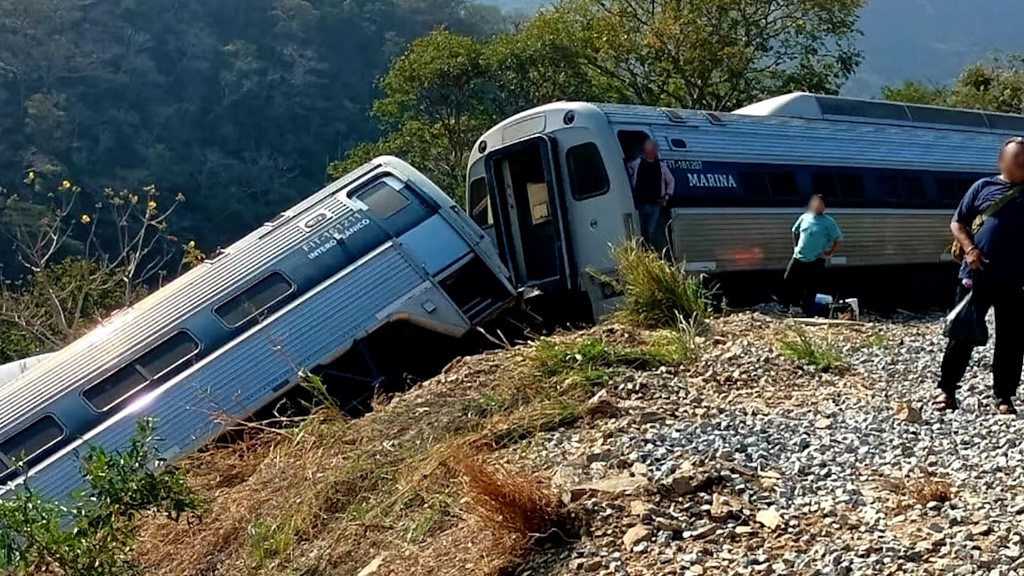
Train Derailment in Southern Mexico Kills 13, Injures Nearly 100 in Oaxaca
At least 13 people were killed and almost 100 others injured after a passenger train derailed in southern Mexico, authorities have confirmed.
The accident occurred in Oaxaca State, in Mexico’s south-eastern region, as the Interoceanic train rounded a bend near the town of Nizanda, according to the Mexican Navy, which operates the country’s railway network.
The train was travelling between the Gulf of Mexico and the Pacific Ocean, carrying 241 passengers and nine crew members at the time of the derailment. The navy said 98 people sustained injuries, with 36 currently receiving treatment in hospitals.
Mexican President Claudia Sheinbaum disclosed that five of the injured were in serious condition, adding that senior government officials, including the Secretary of the Navy, were en route to the crash site.
READ ALSO:
- Tragedy in Lekki as Lexus SUV Crashes Into Children, One Feared Dead, Four Injured
- Presidency Intervenes in Akume, Alia Political Dispute in Benue
- ISWAP Militants Storm Yobe Communities, Wound Village Head, Abduct Driver
Mexico’s Attorney General confirmed that a full investigation into the cause of the derailment has been launched.
Images from the scene showed emergency responders assisting passengers from the train, which left the tracks and partially tilted over the edge of a cliff, complicating rescue efforts.
The Interoceanic rail line, which links the Pacific port city of Salina Cruz with Coatzacoalcos on the Gulf Coast, consists of two locomotives and four passenger coaches. The service was inaugurated two years ago as part of a major federal project to revitalise the Isthmus of Tehuantepec.
Oaxaca State Governor Salomón Jara Cruz expressed deep regret over the tragedy, stating that state authorities were working closely with federal emergency agencies to assist victims and their families.
The Interoceanic railway is a flagship infrastructure initiative launched under former President Andrés Manuel López Obrador, aimed at transforming southern Mexico into a strategic trade and logistics corridor through expanded ports, rail links and industrial development.
Train Derailment in Southern Mexico Kills 13, Injures Nearly 100 in Oaxaca
BBC
-

 metro2 days ago
metro2 days agoIbadan Explosion: Fayose Releases Documents, Claims Makinde Got ₦50bn from FG
-
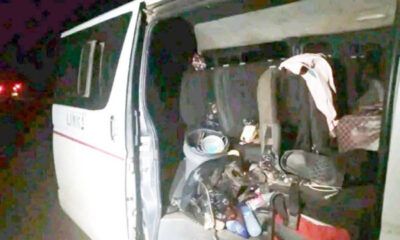
 metro2 days ago
metro2 days agoPlateau Kidnappers Demand ₦1.5m Each as 28 Muslim Travellers Remain in Captivity
-

 metro2 days ago
metro2 days agoNiger Delta Crackdown: Army Seizes ₦150m Stolen Oil, Arrests 19 Suspects
-

 Sports2 days ago
Sports2 days agoCristiano Ronaldo Wins Best Middle East Player at 2025 Globe Soccer Awards in Dubai
-

 Opinion3 days ago
Opinion3 days agoHow a Misleading Channels TV Headline Reignited Nigeria’s Religious Tensions
-

 Sports2 days ago
Sports2 days agoAnthony Joshua injured as two die in fatal Lagos-Ibadan Expressway crash (plus photos)
-

 metro3 days ago
metro3 days agoNigerian Army Kills 438 Boko Haram, ISWAP Terrorists in Seven Months
-
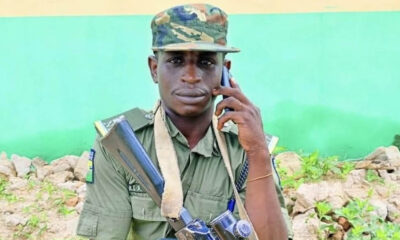
 metro2 days ago
metro2 days agoBello Turji Not Killed in US Airstrikes, Security Expert Debunks Reports





